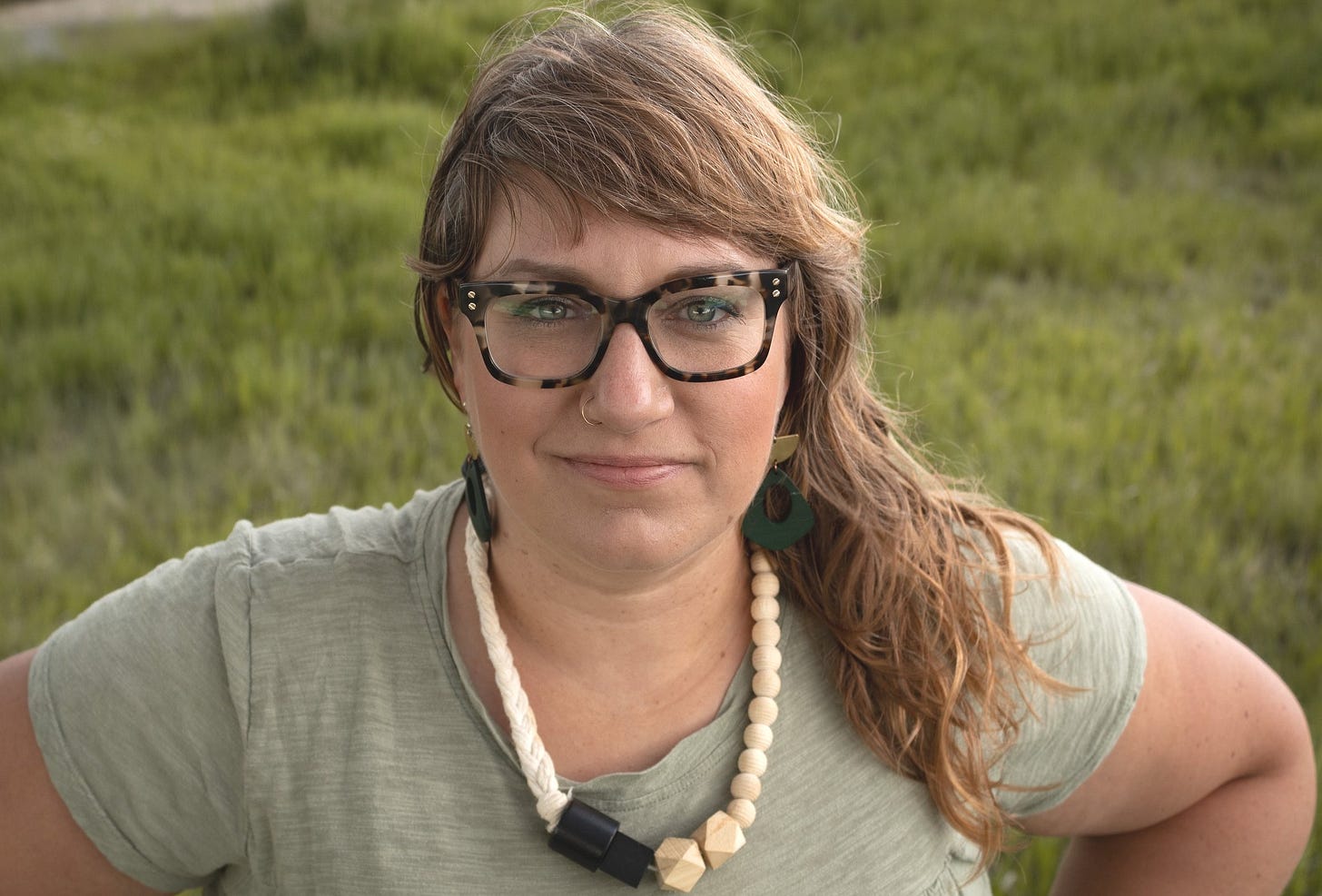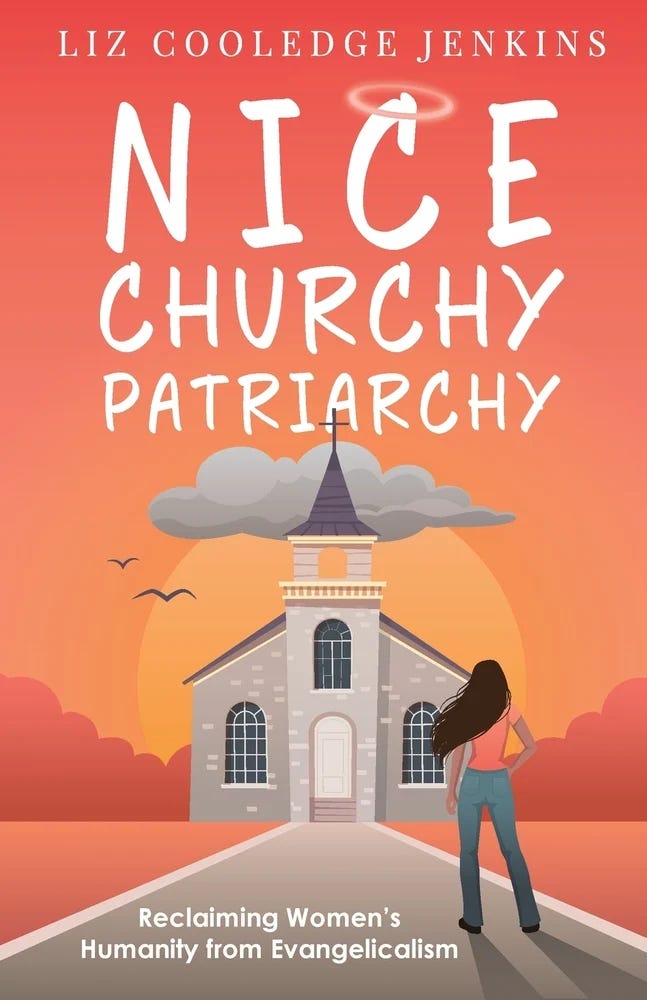the Empathy List #148: Male theology nerd: do we HAVE to debate women's roles at the church picnic?
If so, then choose to listen more than you talk.
Hello friend, Liz here.
You know the moment I mean: a woman is cornered by her pal, the male theology nerd, who wants to “debate.”
The topic is vital to her, the conversation is so important, really truly meaningful, and to her, so much depends upon the answer they reach that even when the timing is bad, she makes the effort. And yet her combatant is just engaging in the sport of debate. He’s brought this up for fun, not to listen, not to learn, but to talk. To her, the topic is central to faith, but to him, it’s nonessential.
Perhaps he means no harm. Or perhaps he’s hankering to win, to crush, to spike the ball with such ferocity that she cannot hope to stay airborne.
If you’ve spent any time in conservative church spaces, I bet you recognize this dynamic. And if you’re a strong women with a loud laugh and a body, any body, well then, you have probably experienced this moment for yourself.
“I want to ask you about that one obscure verse that demeans your personhood. How can you defend you heretical view in light of that out-of-context verse? And by the way, I’m just asking for sport, so if you’re offended, maybe be less sensitive next time.”
Phew.
Male theology nerd, you may mean well, but we women are weary. We need you to back off. Or, at the very least, we are asking you to learn to listen and really hear us. We do not need your sermonizing, we need your curiosity.
Today, I am delighted to share an essay on this very topic by my new friend, Liz Cooledge Jenkins about how to disagree better. Because, yes, we still need to have these deep conversations/debates about how to live out faith in Jesus. In fact, I’d argue that we need a wider diversity of opinions in the capital C Church than we’ve admitted today.
Yet when we have these discussions, both sides of the aisle need to conduct ourselves in a way that honors the personhood and perspective of our opponent—meaning, we must master the art of talking less and listening more. This is the way we find common ground.
I hope you find Liz’s words as helpful as I do. (And, by the way, I recommend you pick up her book, Nice Churchy Patriarchy if you like what you’ve read today!)
Thanks for being here, my friends, and thank you for listening well.
Warmly, Liz Charlotte Grant
Tell me about the strangest “debate” (or strangest debate location) you’ve ever participated in. ;-)
If we have to debate women’s roles… let’s treat women better in the process.
by Liz Cooledge Jenkins, author of Nice Churchy Patriarchy
Let Me Eat My Hamburger in Peace
I remember standing around one afternoon at a church picnic, chatting idly with friends and enjoying the August sunshine. The delightful smell of burgers wafted up from several grills. The potluck side dishes were plentiful. Everything was set for a fun afternoon.
Then, out of nowhere, my friend, let’s call him Ed, brought up 1 Timothy 2:8-15. He wanted to know what I thought. This is the passage of scripture that includes the (in)famous line, “Let a woman learn in silence with full submission. I permit no woman to teach or to have authority over a man; she is to keep silent” (1 Tim 2:11-12, NRSV).
I just wanted to eat my burger and talk about the weather or how work was going. But Ed was asking questions―important questions. And I had some thoughts about what the answers might be.
I don’t remember exactly what I said. I may have talked about the context of these verses within the book of 1 Timothy. A particular group of women in a particular church were being “idle, gadding about from house to house; and...also [being] gossips and busybodies, saying what they should not say” (1 Tim 5:13, NRSV). I may have speculated that, in this context, maybe Paul1 simply wants these particular women to be silent―in the sense of choosing not to gossip about others in harmful ways.
I may have mentioned some of the relevant translation issues. The Greek word for “authority” used in this passage is unusual in the New Testament, and it may mean something more like “usurping authority” or “domineering authority,” not just any kind of authority.
It also feels worth noting that Paul literally writes “I do not permit a woman” (rather than “I permit no woman,” as the NRSV has it, for example)―which leaves open the possibility that he’s thinking of one particularly domineering (or gossiping) woman, rather than all women everywhere.
Ed listened to what I had to say. Then he replied, “Well, I don’t know about all that, but I feel like in the end I kind of have to just take the Bible at face value.”
I think I suggested going back to talking about the weather.

Another Day, Another Debate
I remember eating breakfast one sunny morning at our yearly church camping trip. I was sitting at one end of a long set of picnic tables, when my ears began to pick up pieces of a conversation at the opposite end.
One of the (male, by requirement) church elders started discussing the topic of women in ministry with a female college student. The college student held her own, asking great questions and patiently hearing him out. I asked her later if the conversation bothered her, and she said it didn’t. But it bothered me.
I don’t think the elder ever bothered to ask the student what she thought, and why. He just seamlessly assumed the role of the older, wiser, benevolent teacher, explaining to a young, bright, eager learner The Way Things Should Be.
Asking Women to Debate Complementarianism is Asking Them to Defend Their Personhood (No Wonder Evangelical Women Are Weary)
In the evangelical church world, I could never quite be sure when these conversations would pop up. Gender roles in leadership are still a live topic of discussion in many churches―everywhere from youth groups, to casual conversations among friends, to seminary classes, to elder boards and pastoral ministry teams. Whether or not women should be subordinated to men is an open question―up for discussion at any time, often without warning.
For women, this can be exhausting.
It was exhausting for me in my twenties, in the complementarian church I was a part of for eleven years. And it’s still exhausting today. As with any discussion about a particular marginalized group, it’s so much more wearying for people who are members of that group than for people who are not members of that group.
For people whose rights and limitations, subordination or freedom, rests on the way a question is answered, every discussion takes a toll. How could it not?
As a woman, conversations about complementarianism will always be, essentially, debates about my full personhood. They will always be debates about whether or not I am actually a complete adult human being created in God’s image. The feeling that this is up for discussion is deeply demoralizing.
Yet, these conversations keep happening. And they need to keep happening.
They need to keep happening because many people and many churches still regard women in ministry with ambivalence at best. Many women inhabit faith communities whose policies still limit them from certain leadership roles, whose people are still divided in their minds and spirits.
Avoiding the topic doesn’t help anyone. We need to keep talking about these things. But I think we also need to talk about how these conversations go down.
For one thing, could women get a heads-up? We deserve the chance to be mentally and emotionally prepared. We don’t deserve to be blindsided while enjoying an innocuous-seeming burger or breakfast.
We deserve to opt in and out of these conversations as we choose, rather than feeling coerced into talking about things we don’t have time, energy, or desire to discuss.
I would also suggest that we stop having these conversations “for fun.” I’m not interested in talking about these things with people who are intellectually intrigued by the topic but have no intention of actually changing their views―and often very little recognition that their views might impact someone else’s life negatively.
I think of Julie Rodgers’ words from her memoir Outlove: A Queer Christian Survival Story:
“I wanted someone to acknowledge how shitty it was for people to debate about LGBTQ people as if it were a sport.”
I hear that. And I feel the same way about women in ministry. Debating about us is not a sport. It involves real humans, real lives, real stress hormones coursing through bodies, real acknowledgment of (or failure to acknowledge) shared humanity.

No More Mansplaining Egalitarianism to Women
One last memory: I was hanging out with a few friends after our weekly young adults’ group gathering, and we were joined by a male church planter our church was supporting. The topic of women in ministry came up.
Before I had a chance to weigh in with my own views, the church planter started explaining to me that, in the world of theology, there are things contained in a primary circle, like Jesus’ resurrection from the dead, and things contained in a secondary circle, like women in ministry.
Christians should agree about the things in the primary circle but could disagree about the things in the secondary circle. He drew circles in the air with his hands. He kept on talking. I couldn’t find the space or the words to tell him as politely as possible that I already knew everything he was saying.
I remember that moment with anger. Even if we ignore the mansplaining and pretend he was actually teaching me something―who did he think he was, to place things that impacted my life more than his in a secondary, outer circle? Who gets to decide what is or isn’t okay to disagree about?
Women should be involved in that decision. I could tell that anything I might have said to push back against it would be met with the same condescending smirk he wore on his face as he explained the whole two-circle scheme in the first place, assuming I was unfamiliar with it. And though I was the only woman in the conversation, and he had no interest in involving me. His decision was already made.
We can do better than relegating these issues to a secondary circle of not-really-essential things. If recognizing the full humanity of every person in a congregation isn’t essential, I’m not sure what is.
And, in all these conversations, we can do better than making space for men to talk while we expect women to listen and “learn.” We can moderate these discussions to make sure women’s voices are heard. We can refuse to allow men to dominate debates on questions that impact them less. Women’s voices should be front and center when it comes to policies and attitudes that disproportionately affect our lives—just as queer folks’ voices should be centered when it comes to things that impact them most, and people of color’s voices should be centered in discussions that disproportionately affect them.
Women who desire to be in church communities deserve communities that embrace our gifts gratefully rather than debating them endlessly. But when these debates do happen, we deserve to be heard. We deserve to be taken seriously. We deserve for the topic to be treated seriously. And we deserve to be able to step in and out of these conversations as we choose.
I wish I had known these things at the church picnic. At the breakfast table on the church camping trip. In the one-sided “conversation” with the church planter and his air circles. In all the times and places where the question of women’s subordination rears its necessary but complicated head.
I know these things now. And I think you do, too. We know what we deserve.
Let’s refuse to settle for less.
About Liz Cooledge Jenkins
Liz writes at the intersections of faith, feminism, and justice. She’s a recovering evangelical exploring how we build different kinds of faith communities together — and a different kind of world.
Her first book is Nice Churchy Patriarchy: Reclaiming Women’s Humanity from Evangelicalism, and she wrote it with great love, angst, and the stubborn insistence that faith communities can do better. You can find her at the Substack, Growing Into Kinship. You can also follow her on Instagram at lizcoolj and postevangelicalprayers.
I’m calling the author of 1 Timothy “Paul” for convenience, although it’s likely the letter was written by someone else in Paul’s name. This was standard practice at the time and was not considered dishonest. It just meant that the author intended to write in the same spirit as Paul.







This is absolutely spot on: "'I want to ask you about that one obscure verse that demeans your personhood. How can you defend your heretical view in light of that out-of-context verse? And by the way, I’m just asking for sport, so if you’re offended, maybe be less sensitive next time.'”
If I had a nickel ...
Sometimes I wonder if we shouldn’t enter these conversations by asking why we’re having this conversation to begin with. Why here? Why now? Why you? Because honestly, nine times out of ten, it’s them baiting us.